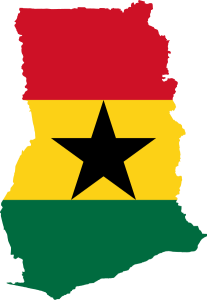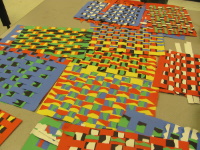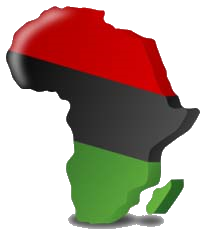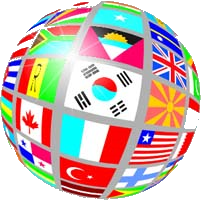Ghana -- School-age
Ghana
Official Name: Republic of Ghana
Ghana was formally called the Gold Coast.
Government Type: Constitutional Democracy
Capital: Accra
County's inhabitants: Ghanaian.
Abbreviation: GH
Currency: The Ghanaian Cedi (GHS, GH![]() )
)
Official Language: English
Ghana
In Ghana there are about eighty languages spoken. Many of these languages are spoken by small groups of people. Ten groups of people and their language is numerically significant.
Languages that are government-sponsored: Akan (which includes: Anyi, Asante [Ashanti], Baule, Fante, and Guang), Dagaare/Wale, Dagbani, Dangme, Ewe, Ga, Gonja, Kasem, and Nzema. Hausa is spoken among Ghana's Muslims.
Religion: The majority of people in Ghana, nearly 68% of the population, are Christians. About 15 % are Muslim and 8% are traditional.
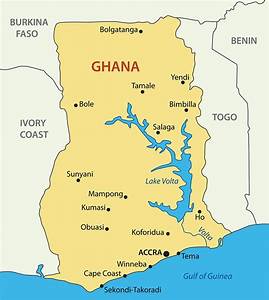
Ghana is a country in West Africa on the coast of the Gulf of Guinea.
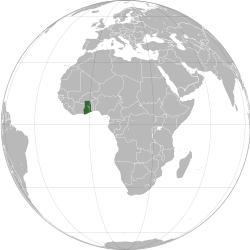
Government
On March 6, 1957, Ghana gained independence from Great Britain. It was led to independence by Kwame Nkrumah who was president for life. Its government was created as a parliamentary democracy. There have been alternating military and civilian governments in Ghana.
In 1992 a new constitution allowed multiparty politics. The president is the head of government and a vice president that are elected every four years. There is a parliament, council of ministers that are selected by the president and approved by parliament, and an independent judiciary. The government is elected by adult citizens voters.
Ghana is a member of the Commonwealth of Nations.
Flag of Ghana
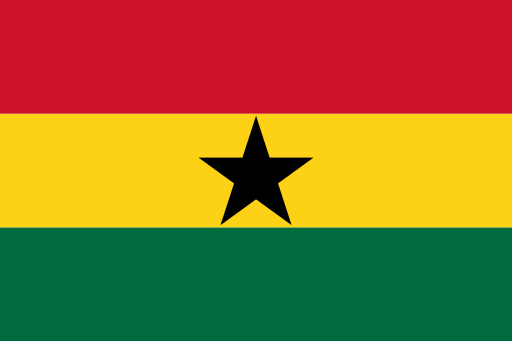
The flag of Ghana is a horizontal tricolor that contains red, gold, and green and a five-pointed black star in the gold strip.
"I decided on the three colours of red, gold and green because of the geography of Ghana. Ghana lies in the tropics and blessed with rich vegetation. The colour Gold was influenced by the mineral-rich nature of our lands and Red commemorates those who died or worked for the country's independence."
-Theodosia Okoh
Super Quick History of Ghana Video
Land
Southern Ghana is covered with dense rain forest, partially cleared to plant cocoa, coffee, banana, and oil palm trees. Wide savannahs extend to the North. The subsoil is rich in gold, diamonds, manganese, and bauxite.
The Black Volta and White Volta rivers flow southward into Lake Volta. Lake Volta is Ghana's largest artificial lake.
Lake Volta is behind the Akosombo Dam, hydroelectric which produces electricity for Ghana.
Climate
Ghana is located only a few degrees north of the Equator. Ghana's weather is tropical-hot and humid. Much of the country is a warm, green ,and humid land.

Kakum National Park
Plants
In the southeast is the coastal savanna which is a mixture of scrub and tall grass, with giant anthills.
In the southern area of Ghana is the forest zone with evergreen and tropical semi-deciduous forest. Tall trees grow such as the silk cotton tree, the African mahogany and the African whitewood (wawa tree). In the southwest are evergreen forest.
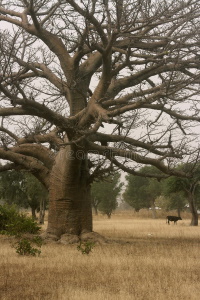
Baobab Tree
Northern Ghana
the northern region is low yearly rainfall followed by drought. In the region grows tall Guinea grass and low trees such as acacia and baobab trees. The Baobab home is the savanna in the North, West, and East regions.
Elephant Species Differences
Animals
Ghana has a variety of animals. In Ghana boasts six national parks and nature reserves which is home to many animals and where they are protected by law. The parks are home to many mammals: antelope, elephants, hyenas, leopards, lions, Roloway monkeys, wild buffalo, and wild hogs.
Poisonous snakes such as cobra, puff adder, and pythons are native to Ghana.
Crocodiles and hippopotamuses live in the rivers.
There are numerous birds in Ghana including frazer-eagle owls, parrots, hornbills, and kingfishers.
There are over 650 butterfly species and wide variety of insects in the Kakum National Park

